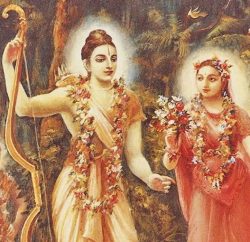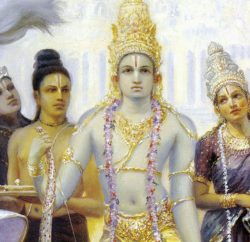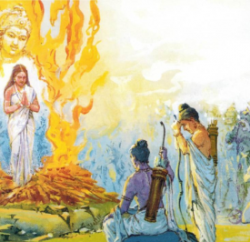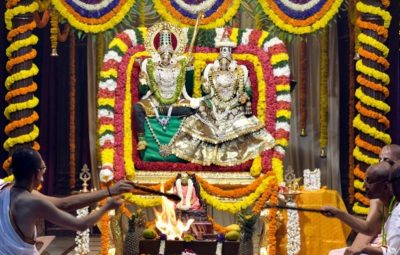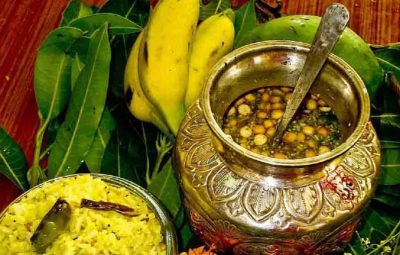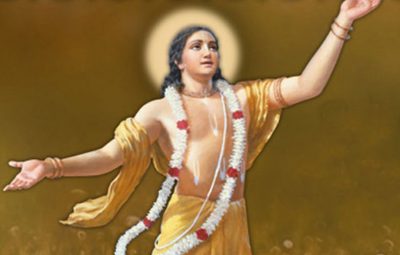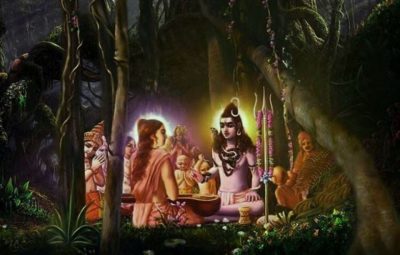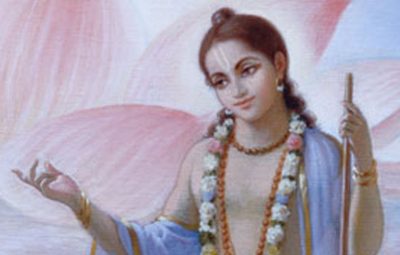Jaya Sri Ram! As we enter into the auspicious ten days of the Dasara, which will culminate in the Vijayadashami, the day of victory of Good, represented by Lord Rama over the Evil-Ravana; we bring you a series of narrations from Ramayana, describing ten transcendental qualities of Lord Ramachandra, one for every day of the Dussehra.
Please read and relish, like and share these articles, and you may also leave your comments to us.
Quality 4: Lord Rāma, the most Adored
The epitome of the word adoration unarguably is Rāma. The epic of Rāmāyaṇa gracefully narrates the impact of Rāma’s exile. The excellently captured raw emotions and sentiments of the common man describe the adoration Rāma had earned for himself.
Farewell
After Rāma accepted the exile, the adoration for him started pouring out, from his family to the officials and the holy sages. Furious Daśaratha asked Kaikeyī, to disappear from his sight saying he couldn’t stay in her presence and he would instead follow Rāma to the forest. As soon as, these words were uttered huge cry rose up.
A palace which always had joyous sounds emanating out of it had been left out with the sound of only agonizing cries.
Witnessing all of these, the king’s intimate friend Sumantra was berserk. With his eyes blazing with wrath; wringing his hands and grinding his teeth, he warned Kaikeyī to renounce her evil aim. If Rāma didn’t become the king, then no pious man would remain in the kingdom. Tears flowed from the old minister’s eyes as he spoke.
Vasiṣṭha, the holy sage who loved Rāma and Sītā as his children, was overwhelmed by distress. He could not stand and watch as They departed while the hard-hearted Kaikeyī looked on gleefully. The sage in grief said that the forest would become the capital of the world. Indeed, the entire state of Kośala and Ayodhyā would leave along with Rāma. The sage blazed with anger, appearing like a smokeless fire.
Public adoration
Without paying heed to the ongoing scene, Rāma along with his wife and brother set out for the exile. The disheartened king then ordered the safe escort of his dearest ones to the forest.
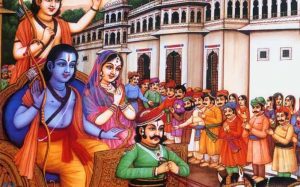 Sumantra took up the reins of the horses and urged them forward. As it passed down the royal highway, the people assembled were stunned with sorrow. Both old-young, male-female, alike rushed towards the chariot as thirsty men would rush toward the water in the desert. Clinging to the sides and the back of the chariot they looked up at Sumantra, calling out to drive it slow as they wished to see their Rāma a little longer.
Sumantra took up the reins of the horses and urged them forward. As it passed down the royal highway, the people assembled were stunned with sorrow. Both old-young, male-female, alike rushed towards the chariot as thirsty men would rush toward the water in the desert. Clinging to the sides and the back of the chariot they looked up at Sumantra, calling out to drive it slow as they wished to see their Rāma a little longer.
As they advanced along the road, many plunged in sorrow at seeing their beloved prince leaving, they lamented in various ways.
Some praised Rāma for his obedience to His father’s word. Some citizens condemned the king, whom they felt had been gripped by some evil spirit. Rāma’s qualities were evident to all; his compassion, learning, gentleness, sense control and mental peace—all were ever visible in that noble prince.
They were pained, just like the tree with all its fruits and flowers is hurt when its root is damaged. They wanted to give up their homes and villages and live with the pious Rāma in the forest.
They would abandon the city and the forest, would become a city and Ayodhyā a forest. Everyone angrily cursed Kaikeyī again and again. Yelling at Kaikeyī and asking her rule over a deserted kingdom, bereft of its people. They wished to share all of Rāma’s joys and sorrows. All of them would go with Rāma. They followed him.
Rāma tried hard to make the people turn back, but they would not return. The more Rāma showed His determination to stick to the path of righteousness and truth, the more the people desired to have Him as their ruler. It was as if Rāma and Lakṣman, by the cords of Their virtuous qualities, had bound the people and were dragging them along.
As dusk approached, Rāma fell asleep. Lakṣman stayed awake, guarding His brother. Nearby He could see the many fires lit by the people who were following Rāma toward the forest.
In the middle of the night, Rāma awoke and spoke with His brother and planned to leave the forest, since the people would not listen to them and continue following them. Throwing them off their trail, they went off.
As the dawn approached, in the camp, the sound of numerous birds rose the citizens and they soon discovered, that Rāma and His party had left. They were shocked and began to lament loudly. They condemned the sleep for having stolen Rāma from them. They would meet their end by fasting until death. Seeing big logs of dry woods, some of them suggested they pile up the wood to make a funeral pyre and immediately enter it.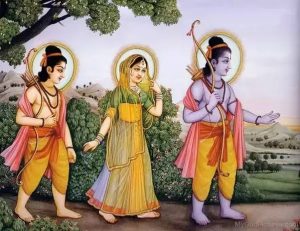
When they returned without Rāma, the city became desolate and devoid of all happiness. Ayodhyā seemed at that time to be like the sky bereft of the moon. Everywhere its citizens, shed tears and all of them felt like giving up their lives. No one rejoiced on any occasion, even when coming upon unexpected fortune or seeing the birth of a firstborn son. Merchants did not display their merchandise, nor did the goods even seem attractive. Householders did not cook food, and the household deities were neglected.
The adoration of Rāma was such that, some started praising Lakshmana as the only virtuous man in the world who could follow Rāma to the forest to serve Him. The glorious and ever-truthful Rāma was their only shelter. All the people remained in their own homes, thinking only of Rāma.


